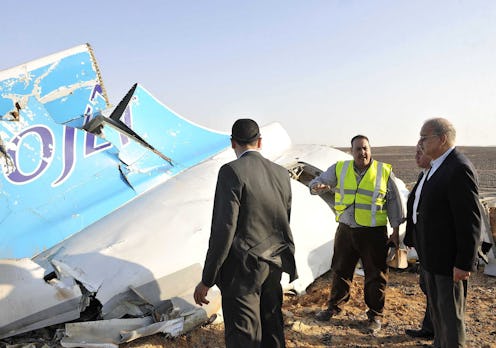News
Could The Russian Plane "Bomb" Have Been Stopped?
Officials from the United States and United Kingdom said there is a strong chance that the Metrojet crash in Egypt's Sinai Peninsula was caused by a bomb planted by the Islamic State. Thursday Egyptian and Russian officials disputed the claim, calling it premature, but the United Kingdom and Ireland have halted all flights to and from Sharm el-Sheikh, the Egyptian airport on the Red Sea where the Russian flight flew from, citing insufficient airport security.
The Egyptian President Abdelfattah al-Sisi was in London Thursday, meeting U.K. Prime Minister David Cameron to speak about the incident. Cameron said at a press conference after the meeting that "more likely than not" the plane was brought down by an explosive device. He said that he empathized with Egyptians who rely on tourism for economic activity, but said he wanted to put the safety of British citizens first.
Russia and Egypt both have a lot to lose if the plane was brought down by ISIS or another group with access to bomb-making equipment. Egypt, because it relies so heavily on tourism; and Russia, because it could draw scrutiny at home about the country's involvement in Syria. The original ISIS message claiming responsibility for the crash said it was in response to Russia's bombing of the Islamic State in Syria.
Meanwhile, as many as 20,000 British tourists are stranded in Sharm el-Sheikh. Cameron said it will evacuate them regardless of cost but that normal flights may not resume for weeks. Ireland followed suit, but scheduled flights to Russia, Turkey, and other destinations in Europe and the Middle East have not been affected.
A British team of security experts to the airport to investigate the security in place at the time of the crash, according to the Associated Press. British Foreign Secretary Philip Hammond said that he expected limited flights to resume on Friday after measures are taken to improve and tighten security at the airport. He said temporary improvements in security measures could get flights going again to bring current vacationers home, but a long term solution will also be needed. "We will not resume normal flying activity until we are confident that there are long-term, sustainable arrangements in place that make flying between the U.K. and Sharm el-Sheikh safe," Hammond said.
Sky News interviewed a passenger that claimed a security staff member at the airport had been seen playing Candy Crush on his phones while scanning baggage. Others reported bags that were left unattended and airport workers who were allowed access to secure parts of the airport without passing through scanners. The head of the Sharm el-Sheikh airport was replaced Thursday. He was promoted and replaced by a pilot. Adel Mahgoub, chairman of the company that runs Egypt's airports, told ITV that it was unrelated to the crash.
Russian flights have continued to depart as Russian officials dismissed the U.S. and U.K. claims. Much as they had dismissed Metrojet's claims that an external impact caused the crash, they said the terrorism theories were premature. "One cannot rule out a single theory, but at this point there are no reasons to voice just one theory as reliable — only investigators can do that," Dmitry Peskov, a spokesman for President Vladimir Putin, told reporters Thursday.
An American official said Tuesday that satellite surveillance showed a flash of light moments just as the jet broke apart. The New York Times reported that European officials said the flight data recorder abruptly stopped, which would also support the theory. Russian state TV did not cover either theory.
